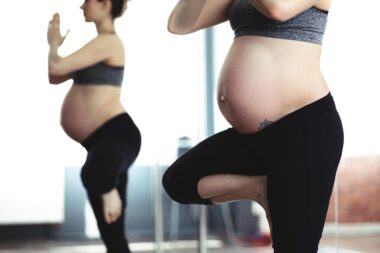How Walking Can Help Control Blood Pressure During Pregnancy
Pregnancy is a time of significant physiological change, affecting various bodily systems, including the cardiovascular system. One common concern for expectant mothers is hypertension, or high blood pressure, which can lead to serious complications if left unchecked. Engaging in regular physical activity, such as walking, is a beneficial and low-impact way to manage blood pressure effectively. Walking increases blood circulation, promotes better heart health, and even has stress-reducing benefits which are essential during this time. As the body adapts to the growing baby, maintaining a healthy lifestyle through exercise can help mitigate risks associated with high blood pressure. Besides improving circulation, walking can enhance overall well-being by releasing endorphins, which may alleviate mood swings and anxiety. Incorporating a regular walking routine can lead to improved energy levels during the day, ultimately benefiting both mother and baby. Always remember to consult with your healthcare provider before starting any new exercise regimen during pregnancy to ensure it is safe and appropriate for your individual circumstances. By establishing a walking routine, pregnant women can proactively manage their health in a safe manner.
Benefits of Walking for Pregnant Women
Walking is an excellent exercise choice for pregnant women as it is easy to incorporate into daily routines. Unlike more strenuous forms of exercise, walking is gentle on joints and reduces the risk of injury. This accessibility makes it easier for women of all fitness levels to stay active throughout their pregnancy. Regular walking can also promote better sleep, which is crucial as pregnancy can lead to increased fatigue and discomfort during the night. Furthermore, consistent physical activity helps regulate weight gain during pregnancy, aiding in overall health. Walking can specifically improve cardiovascular health, which is especially important for managing blood pressure. When walking, the heart pumps more efficiently, promoting better nutrient delivery to both mother and baby. The flexibility of walking allows for varying durations and intensities, which can be adjusted according to energy levels and mood fluctuations during pregnancy. Pregnant women should aim for at least 30 minutes of moderate walking most days of the week. Setting realistic goals and gradually increasing walking distance can ensure mothers remain motivated while maintaining safety during their exercise regimen.
Including walking in daily routines can foster healthier habits that last beyond pregnancy. Adjusting daily activities to incorporate walking can yield substantial health benefits. For example, opt for stairs instead of elevators or choose to park further from the entrance at stores. Even walking around the house or yard can contribute to physical activity goals. Additionally, walking can be a social activity, providing an opportunity for expectant mothers to connect with friends or family, making the exercise more enjoyable. Having a walking partner can encourage consistency and accountability, making it easier to stick to a routine. It can offer a break from the demands of pregnancy while also promoting mental health by reducing feelings of isolation. Enjoying nature during walks can further brighten moods and reduce stress levels. Taking time to appreciate one’s surroundings provides a calming effect that can directly benefit the developing baby. These lifestyle changes not only enhance general well-being for mothers but can also positively impact their babies’ health. The importance of such habits during pregnancy can’t be overstated, as they encourage continued fitness even after childbirth.
Precautions When Walking During Pregnancy
While walking is generally safe during pregnancy, expecting mothers should take certain precautions to ensure their safety. It is essential to wear appropriate footwear to provide arch support and cushion the feet, which helps maintain balance. Hydration is also crucial, as pregnant women can be more susceptible to overheating. Carrying water during walks or scheduling walks in cooler hours of the day can minimize risks. Start at a pace that feels comfortable and gradually increase the intensity as endurance builds. Additionally, being aware of surroundings is essential to avoid potential hazards. If weather conditions are poor, opting for indoor walking paths or treadmills is a smart choice. Monitoring the body for any signs of discomfort is vital; if experiencing shortness of breath, dizziness, or unusual swelling, it is crucial to stop and consult a doctor. It’s also wise to check in with healthcare professionals prior to beginning an exercise plan, particularly for those who have a history of health concerns. Listening to one’s body is key; taking breaks when necessary can ensure that walking remains an enjoyable experience throughout pregnancy.
Many diagnostics in prenatal care assess blood pressure levels, making awareness of these numbers essential. During regular check-ups, monitoring blood pressure can help detect any unusual changes in health. Pregnant women should understand the signs that could indicate complications related to hypertension, such as severe headaches, visual disturbances, or abdominal pain. If any of these symptoms occur, seeking immediate medical attention is vital. Regular exercise, including walking, can serve as a proactive approach in preventing conditions such as preeclampsia, which involves high blood pressure and damage to organs. By managing lifestyle choices and engaging in moderate exercise, the risks associated with hypertension can be mitigated. It’s important for mothers to acknowledge their body’s needs and adjust accordingly. Understanding the importance of maintaining a low-stress environment, coupled with physical activity, can foster emotional stability. Consulting with healthcare providers about personalized exercise programs can help with blood pressure management effectively. This empowerment through education and physical activity benefits not only the mother but also the developing baby, leading to healthier outcomes in the long run. Making conscious choices will promote a safer pregnancy overall.
Post-birth, many mothers find it challenging to maintain active lifestyles due to newborn responsibilities and fatigue. However, the habits established during pregnancy can translate into healthier behaviors after childbirth. Walking can be combined with baby care routines, allowing new mothers to remain active while tending to their infant’s needs. For instance, every walk can double as a bonding opportunity, creating a shared experience that incorporates fresh air, social interaction, and physical activity. Finding community resources or groups focused on walking can supply support and motivation for mothers. Walking sessions can be an extension of postnatal care, helping restore energy and manage weight. Incorporating walking into daily life can also contribute to improved mental health after childbirth, alleviating feelings of postpartum depression or anxiety. The experience of walking with a stroller can cultivate a balance between caring for the baby and prioritizing physical health. Educating newly postpartum mothers about the importance of resuming activity gently can inspire confidence. Engaging with peers can encourage accountability and enhance physical fitness levels across a supportive community. Establishing this cycle of healthy living can contribute positively to a family’s long-term health.
Conclusion on Walking and Blood Pressure Management
In conclusion, walking presents a valuable and safe method for managing blood pressure during pregnancy. The benefits of moderate exercise such as enhanced circulation, improved cardiovascular health, and emotional well-being make it indispensable. Establishing a routine can reinforce physical stamina, boost energy, and promote overall health throughout pregnancy. It is vital that pregnant women remain proactive about their health by incorporating walking into their schedules. The long-term advantages of regular exercise extend beyond pregnancy, influencing both maternal and child health positively. Remember to always prioritize safety and listen to your body’s signals while walking. Engaging in this activity not only helps control blood pressure but also fosters connection with the growing baby and promotes a sense of well-being for the mother. A supportive community, whether friends who join for walks or online groups, can provide additional encouragement during this journey. Walking can help cultivate a healthy mindset, leading to improved health outcomes for both mother and child. As such, it is worthwhile for pregnant women to embrace the wonderful benefits of walking as a lifestyle choice.





